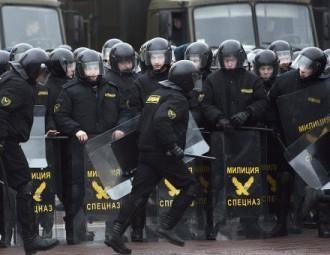Uladzimir Matskevich: The authorities want to make Belarusans scared

By beating and arresting journalists and participants of the “Chernobyl Path”, Belarusan authorities succeed in intimidating society. This objective works independently of the actual situation.
This was reported by Uladzimir Matskevich, the head of the Board of the International Consortium “EuroBelarus”.
Despite the fact that the authorities have allowed “Chernobyl Path” this year, still there were lots of detentions and arrests of journalists and activists. One of the organizers, an ecologist Tatsiana Novikava was blocked at her own apartment before the demonstration began. Iryna Sukhij, the chairperson of Eco House, together with the activists Volha Kanavalava, Vasil Semyanikhin and Kanstantsin Kirylenka were directed to the Pershamaiski district police station to be left there for three hours for identification.
After “Chernobyl Path” Henadz Barbarych and Aliaksandr Jarashevich, “Radio Racyja” journalists, the journalists, together with other activists, were arrested only to be found guilty of disobedience to police later.
Could the actions of the Belarusan authorities be somehow explained? Why was it necessary to draw attention to the demonstration with few participants? Would it have been easier just to ignore it?
“I don’t know why did they do that, - Uladzimir Matskevich admitted. – I can only draw conclusions from that. However, it is not fresh news. Belarusan authorities demonstrate their brutality, and, so to say, force and absolute power: “I do whatever I want”. And it is done irrespectively of what, where and when is happening”.
The head of the Board of “EuroBelarus” noted that those who support the regime find such behaviour appropriate for them. “The authorities have to show their power. In the eyes of these people power means tyranny. They do it in order to make Belarusans scaredand capable of reading between the lines. This is a signal that allowing any kind of actions organized by the opposition doesn’t necessarily mean that these actions are approved by the authorities, and that people still have to be careful while participating in such actions”, - claimed Uladzimir Matskevich.
-
03.01
-
07.10
-
22.09
-
17.08
-
12.08
-
30.09



























